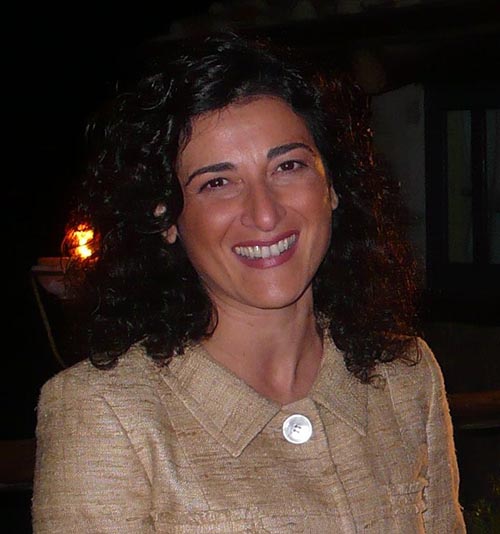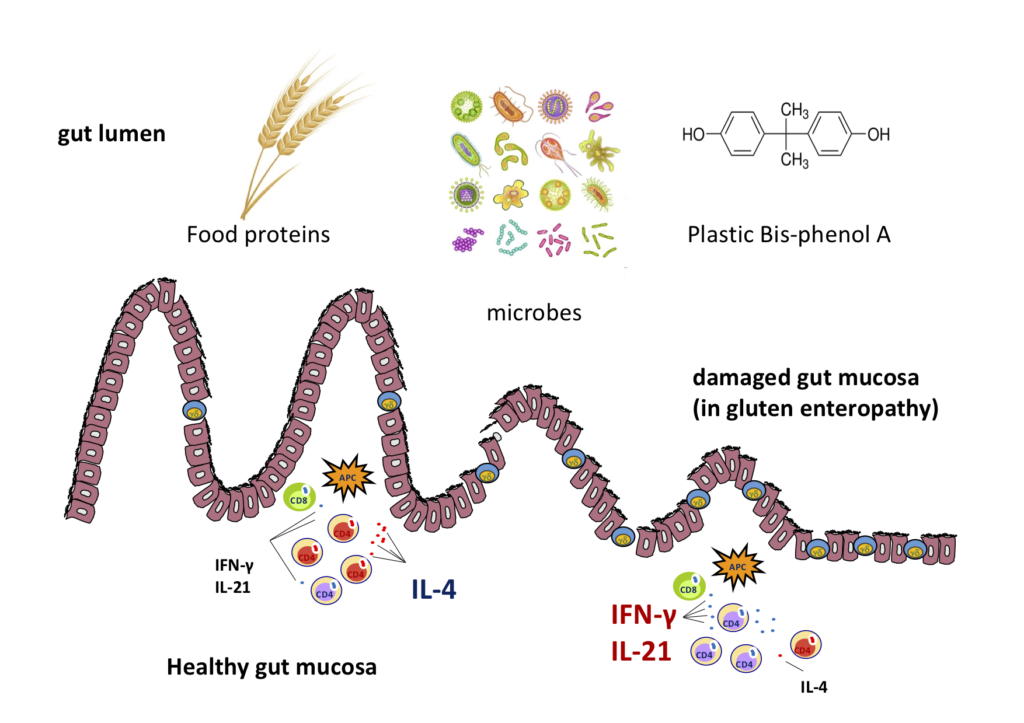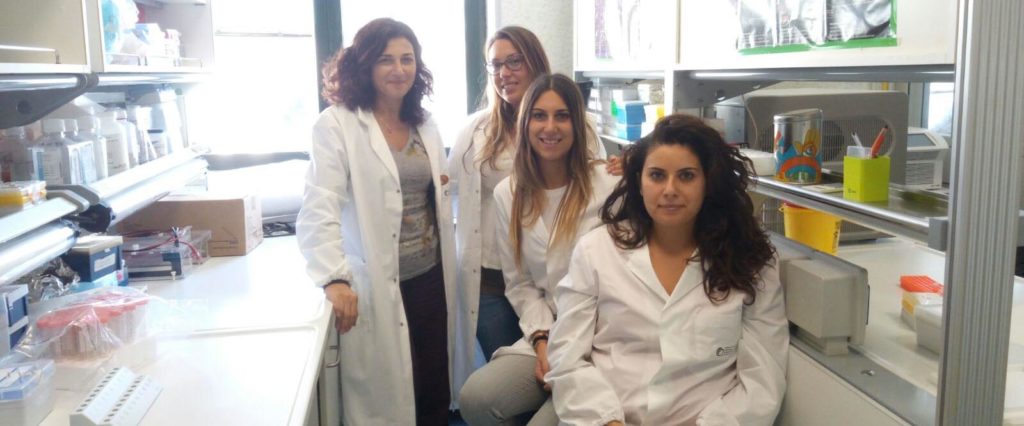
Carmen Gianfrani
Laboratory of Mucosal Immunology and Immune Nutrition (MIIN LAB)
Keywords: mucosal immunology, immune nutrition, celiac disease
Dr Carmen Gianfrani is a mucosal immunologist and head of MIIN LAB, with a long experience in food-related immune disorders, in particular celiac disease.
Her research group has contributed to the characterization of gluten T cell epitopes and to the development of immunomodulatory strategies to recover oral tolerance to gluten, as well as of enzymatic strategies to detoxify gluten proteins, that are currently in clinical trials.
In the recent years, she has investigated the role of HLA risk gene expression in the inflammatory response to gluten proteins, with implication for celiac disease prevention, and the immunopathogenesis of paediatric inflammatory bowel disease (IBD), in particular she studied the role of ATG16L1 gene polymorphisms in autophagy alteration in IBD patients.
The main scientific interests of MIIN LAB are:
- Immune pathogenesis of celiac disease and pediatric inflammatory bowel disease
- Role of HLA class II gene expression in shaping the pathogenic immune response in autoimmunity
- Characterization of gluten peptides stimulating helper and cytotoxic T cell response in celiac disease patients
- Identification of ancient wheat crops with reduced content of toxic gluten sequences and with high in vivo digestibility
Dr Gianfrani is the author of more than 80 original papers and reviews in international journals, and of book chapters on mucosal immunology and food science.
As immunologist and expert of celiac disease, she is very active in science dissemination on Italian mass media

Education & academic qualification
- 1992: Laurea degree cum laude in Biological Science in 1992 at the University, Federico II of Naples with a thesis on organic chemistry.
- 2013: National academic qualification as associate professor in “Applied Biology” 05/F1, (D.D. 222/2012).
- 2020: National academic qualification as full professor in “General and Clinical Pathology” 06/A2, (D.D. 1532/2016).
Positions:
Senior researcher and Group Leader of MIIN LAB at IBBC, CNR Naples.
Honours/Awards:
- December 2020, Member of Scientific Board of European Society for the Study of Celiac Disease (ESsCD)
- May 2020, German Federal Ministry of Education and Research (BMBF). Member of the evaluating committee of a research funding call.
- November 2018 to date: Member of the Advisory Board of Nemysis L.T.D Dublin, Ireland.
- September 2018 to date, Executive Member, Working Group on Prolamin Analysis and Toxicity.
- January 2011 to date, Editor of Pediatric Research, Gastroenterology Section.
- December 2012 to date, Member of the Scientific Committee of the Italian Celiac Disease Foundation (FC).
- January 2001 to date, Member of the Scientific Council of the European Laboratory for the Study of Food-Induced Diseases (ELFID), University of Naples Federico II.
- 2010: CNR Short-term mobility for research activity at Autoimmunity and Transplantation Division, The Walter and Eliza Hall Institute, Melbourne, Australia (Dr. Robert Anderson’s LAB).
- 2006: CNR Short-term mobility for research activity at Autoimmunity and Tolerance Laboratory, Department of Medicine, University of Los Angeles, California (prof. Antonio La Cava’s LAB).
- 2003: Contract funded by NOVARTIS for research activity at Telethon Institute for Gene Therapy (TIGET), Ospedale San Raffaele, Milan (prof. Maria Grazia Roncarolo’s LAB).
- 1997-1998: CNR fellowship for research activity at Epimmune Corporation, San Diego, California (prof. Alessandro Sette’s LAB).
Patents:
Treatment of cereal flours for food consumption by celiac patients. Inventors: Dr. Mauro Rossi, Carmen Gianfrani, Rosa Anna Siciliano. National patent. Filed with the Chamber of Commerce, Industry, Crafts and Agriculture of Milan. MI 2006 A 002080 C12N A21D, 30.10.06. Ref CNR 1838. PCT 2008/053310 A2 of 05/08/2008.
Picascia S, Camarca A, Malamisura M, Mandile R, Galatola M, Cielo D, Gazza L, Mamone G, Auricchio S, Troncone R, Greco L, Auricchio R, Gianfrani C. In Celiac Disease Patients the In Vivo Challenge With the Diploid Triticum Monococcum Elicits a Reduced Immune Response Compared to Hexaploid Wheat. Mol Nutr&Food Res 2020. doi: 10.1002/mnfr.201901032.
Vitale S, Santarlasci V, Camarca A, Picascia S, Di Pasquale A, Maglio M, Maggi E, Cosmi L, Annunziato F, Troncone R, Auricchio R, Gianfrani C. The intestinal expansion of TCRγδ+ and disappearance of IL4+ T cells suggest their involvement in the evolution from potential to overt celiac disease. Eur J Immunol. 2019. doi: 10.1002/eji.201948098.
Pisapia L, Camarca A, Picascia S, Bassi V2, Barba P, Del Pozzo G, Gianfrani C. HLA-DQ2.5 genes associated with celiac disease risk are preferentially expressed with respect to non-predisposing HLA genes: Implication for anti-gluten T cell response. J Autoimmun. 2016. doi: 10.1016/j.jaut.2016.03.016.
Strisciuglio C, Miele E, Wildenberg M.E, Giugliano F.P, Andreozzi M, Vitale A, Capasso F, Camarca A, Barone M.V, Staiano A, Troncone R, Gianfrani C. T300A variant of autophagy ATG16L1 gene is associated with decreased antigen sampling and processing by dendritic cells in paediatric Crohn’s disease. Inflamm Bowel Dis, 2013. doi: 10.1097/MIB.0b013e3182a6a11c.
Mazzarella G, Stefanile R, Camarca A, Giliberti P, Casentini E, Marano C, Iaquinto G, Giardullo N, Auricchio S, Sette A, Troncone R, Gianfrani C. Gliadin activates HLA Class I-restricted CD8+ T-cells in coeliac intestinal mucosa and induces the enterocyte apoptosis. Gastroenterology. 2008.

Post-doctoral fellows:
Stefania Picascia stefania.picascia@ibbc.cnr.it
Serena Vitale serena.vitale@ibbc.cnr.it
Graduate student:
Ilaria Mottola (University Federico II, Naples)
- 2018-2021, Italian Ministry of Health. Bando Ricerca Finalizzata-2016
- 2017, Italian Association of Celiac Disease (AIC/FC), fellowship call-2017
- 2015-2017, Italian Ministry of University and Research PNR 2011- 2013. Flagship Interomics
- 2012-2015, National Health and Medical Research Council Australia – NHMRC
- 2010-2012, Italian Ministry of University and Research, PRIN-2009.
- Highlight:
Coeliac disease: Age not important to T cells?
http://www.nature.com/nrgastro/journal/v12/n10/full/nrgastro.2015.149.html
Original article: Consistency in Polyclonal T-cell Responses to Gluten Between Children and Adults With Celiac Disease. By Hardy MY, Girardin A, Pizzey C, Cameron DJ, Watson KA, Picascia S, Auricchio R, Greco L, Gianfrani C, La Gruta NL, Anderson RP, Tye-Din JA. Gastroenterology. 2015 Nov;149(6):1541-1552. http://www.sciencedirect.com/science/article/pii/S0016508515010070
- Highlight:
https://www.journals.elsevier.com/journal-of-autoimmunity/highlighted-articles/highlighted-article-march-2018-journal-of-autoimmunity
Original article: Expression level of risk genes of MHC class II is a susceptibility factor for autoimmunity: New insights.Gianfrani C, Pisapia L, Picascia S, Strazzullo M, Del Pozzo G. J Autoimmun. 2018 Jan 10. pii: S0896-8411(17)30626-1. doi: 10.1016/j.jaut.2017.12.016.
https://www.sciencedirect.com/science/article/pii/S0896841117306261
